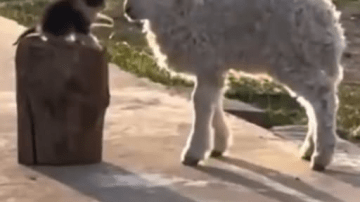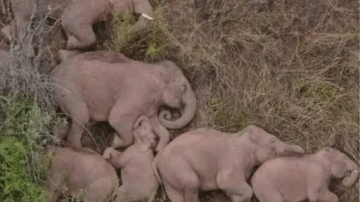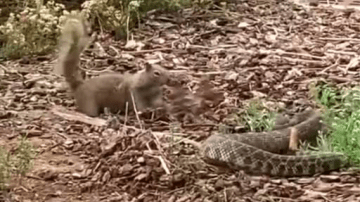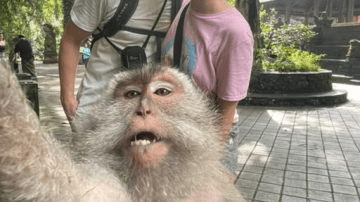Once upon a hot summer’s afternoon, in a dusty village edged by fields of waving grass, a tiny puppy named Milo heard a shriek. It was a sound unlike any he had ever heard — high-pitched, trembling, desperate. His ears perked up, and every instinct told him that someone was in trouble. Milo’s thin paws carried him past thorny bushes, around a rusting fence, and into the heart of danger.

At first, Milo saw nothing but empty dirt road and the hot breeze dancing over dry earth. But then his sharp eyes caught a shape in the distance: a massive, trembling form trapped beneath a tractor’s front wheel. The enormous animal was stamping, attempting to rise, but each effort made it sink deeper into soft soil. It was an elephant — young, yet already large — and clearly terrified. The ground around its legs was churned and muddy, as though the earth itself resisted its movement.
Milo’s heart pounded. Though he was small, each beat felt powerful and full of purpose. Without a second thought, he dashed toward the scene, barking at full volume. His voice echoed in the open fields, shrill and dogged.
The elephant — call her Asha — turned her enormous head toward the puppy, eyes brimming with fear and uncertainty. She lifted her trunk as though to ask, “Who are you?” But when she saw this tiny creature racing toward her, the sight was so astonishing she froze. A puppy, decidedly small and frail, was attempting to help her.
Milo did not hesitate. He ran around the narrow gap between wheel and earth, digging with his paws, scratching at soil, pulling and tugging at loose grass and roots. He barked and whined, urging any passing human to help. But no one came. The village was modest, and the hot air blanketed every ear; no one had heard.
Asha trumpeted in fear, trying to wriggle free, but the more she moved, the more the wheel pressed into her leg. The tractor’s axle groaned ominously. Milo repositioned himself. He dragged a vine toward the elephant’s trunk, hoping she could pull if he fastened it. He used his little body to shield her eyes from dust and grit.
Time dragged. The sun slid lower in the sky, casting long shadows across the field. Milo’s paws bled from digging in stony soil, and his tongue lolled from exhaustion. Yet he refused to stop. He barked louder, his voice raw and urgent. At last, a farmer approached — first slowly, then bounding toward them, calling out. He had heard the distant barking and came to investigate.
When the farmer laid eyes on the scene, he stopped in disbelief: an elephant pinned under a tractor, and a little puppy working furiously around it. He dropped his tools, ran to his truck, and fetched heavy ropes, stakes, and a jack. Other villagers gathered, drawn by commotion, curious and anxious.
Milo backed away as the men lifted the tractor’s weight bit by bit with great effort. Asha trembled, relief flooding her as the weight eased. The farmer secured ropes around her legs, anchoring them to sturdy stakes to prevent sudden jolts. At last, with coordinated muscle and careful coaxing, they lifted the wheel just enough for Asha to pull free.
She rose shakily, her legs trembling. Her eyes locked on Milo, and she bent her head low in gratitude. She raised her trunk and gently touched him with a soft vibration. The crowd gasped. The sight was unforgettable: the great beast acknowledging the tiny hero who would not surrender.
Milo staggered, fatigue overwhelming him. But when he collapsed onto the dusty ground, Asha knelt and used her powerful trunk to help lift him to her side. She wrapped her trunk protectively around him and guided him away from danger. The villagers watched, stunned, as the elephant cradled the puppy like a mother holding a child.
At that moment, children crowded closer, and the hush that fell upon the gathering felt sacred. The farmer knelt beside Milo, cleaned his wounds, and offered him fresh water and food from his lunch. Milo lapped it greedily, trembling but alive.
In the days that followed, the story spread through nearby villages and cities alike. It became a tale of courage and connection across species — the poor puppy who rescued the elephant from a tractor. Animal lovers and storytellers carried it far and wide in speech and writing. Some said Milo had been born under an auspicious moon; others claimed Asha would never forget her savior.
What remained irrefutable, though, was the bond that formed that day. Milo lived by Asha’s side in a fenced garden near the village. She was large, wise, and gentle. He was small, scrappy, and bold. But each morning, Milo would trot to her side, bristles raised, greeting her with a bark and a wag. Asha would stretch her trunk to him, touching his ears, nudging him playfully.
Villagers visited often. Children came with timid excitement. Tourists came later, having heard the legend. They watched with delight as the puppy hopped over Asha’s foot or curled at her toes. Photographs captured the contrast: mighty elephant, tiny hero. Online posts praised the tale; the story went viral. People from cities far away donated food, veterinary care, and attention.

Yet, Milo and Asha remained humble, focused on friendship. Each evening they walked by the riverbank, the elephant’s heavy footsteps sending ripples across wet sand, the puppy’s light paws padding beside her. They watched sunset shadows stretch across water, and each night Milo curled at her feet in the shelter of her legs, feeling safe, tail curled, chest rising in steady breaths.
Then one day, a rival herd of elephants passed through the region. They stopped at the village, drawn by water and grazing land. One matriarch noticed Asha and recognized her as one of their own. She approached and trumpeted, calling her family. Asha stiffened, but the matriarch placed her trunk gently on her side, urging her to return. The herd had traveled a long route, and they needed her presence.
The villagers and Milo sensed the moment. Milo stood firm beside Asha, chest puffed, ears erect. Asha’s eyes flicked between herd and puppy. The matriarch signaled, and Asha turned. She gave one last look to Milo, touching him with her trunk. Then she stepped forward, joining her family.
For a moment, sorrow hung heavy. But then the matriarch gestured for Milo to follow. The villagers watched wide‐eyed as the small puppy bounded onto the dusty trail behind the elephants. Milo joined the journey home for Asha, loyal to the end.
They walked out of the village together, an unlikely pair. Asha’s herd surrounded them. Milo trotted, refusing to be left behind. The trail wound through forest paths, border streams, fields. Milo’s tongue lolled, paws weary, but he never faltered. Asha slowed when she saw him lag. She lowered her trunk, nudged him forward gently, encouraging every step.
Night fell. The herd settled near a shaded clearing. Asha curled beside Milo, sharing her warmth, protecting him from prowling darkness. In the firefly glow they slept.
In time, Milo’s courage inspired the other elephants. They came to accept him as a guardian of sorts. He warned of predators, barked when stalkers drew near, and scouted ahead on paths. The herd grew to trust the tiny but indomitable puppy.
Years passed. Milo grew older, slower, his muzzle grayed. Asha matured into a matriarch, strong and wise. They journeyed together across plains and forests, partners in memory, guardians of one another.
Villagers and travelers still tell the story: “The poor puppy who rescued the elephant from a tractor” became more than a legend. It became a symbol of courage beyond size, loyalty beyond species. It encouraged people to look past appearances, to act when others suffer, and to honor the bonds that override fear and logic.

When children hear it, they gasp at the thought: a puppy so small, a creature so powerful. And yet Milo shows that the size of one’s heart matters more than the size of one’s body.
If anytime you walk near a field in the evening, you just might glimpse an old elephant by moonlight, with a little dog curled at her feet. You might sense their unspoken story of rescue, loyalty, and love — an unforgettable tale, one that draws tears and wonder. And you would know that the world still holds room for miracles, made not with might, but with heart.





